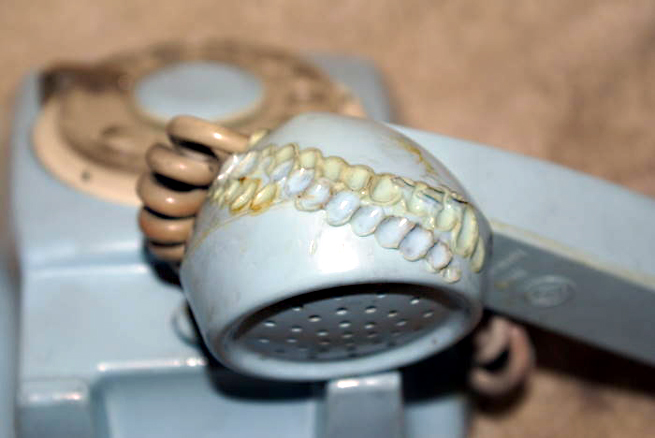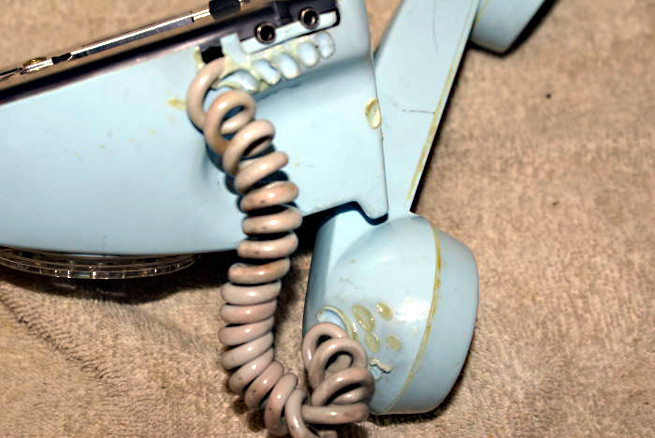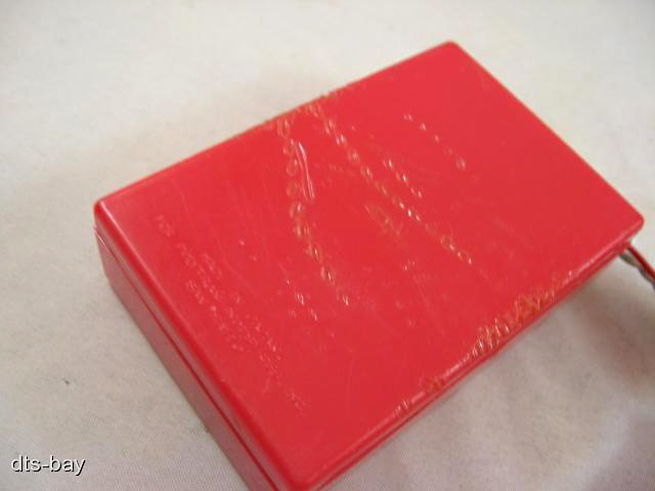Cabinet Repairs
Forum home - Go back to Cabinet Repairs
|
Plastic insulation can attack other plastic
|
|
|
« Back ·
1 ·
Next »
|
|
|
Return to top of page · Post #: 1 · Written at 8:29:29 PM on 7 July 2013.
|
|
|
|
Location: Sydney, NSW
Member since 28 January 2011 Member #: 823 Postcount: 6933 |
|
Not concerning radios as such, but further to the discussion on restoring plastic cases, I have come into possession of a pair of vintage toy telephones made in Japan and dating to the late 1950's or early 1960s. They have been stored in their original box for probably 50 years.   |
|
|
Return to top of page · Post #: 2 · Written at 9:56:04 PM on 7 July 2013.
|
|
|
|
Administrator
Location: Naremburn, NSW
Member since 15 November 2005 Member #: 1 Postcount: 7606 |
|
At first I thought, this couldn't be right but there it is in living colour. ‾‾‾‾‾‾‾‾‾‾‾‾‾‾‾‾‾‾‾‾‾‾‾‾‾‾‾‾‾‾‾‾‾‾‾‾‾‾‾‾‾‾‾‾‾‾‾‾‾‾‾‾‾‾‾‾‾‾‾‾‾‾‾‾‾‾‾‾ A valve a day keeps the transistor away... |
|
|
Return to top of page · Post #: 3 · Written at 7:45:05 PM on 8 July 2013.
|
|
|
|
Location: Ballarat, VIC
Member since 4 January 2011 Member #: 803 Postcount: 456 |
|
I've seen this happen before but not as bad as this. I try not to store any equipment with PVC cables pressed against plastic surfaces to avoid this occurring. |
|
|
Return to top of page · Post #: 4 · Written at 9:51:19 PM on 8 July 2013.
|
|
|
|
Location: Sydney, NSW
Member since 28 January 2011 Member #: 823 Postcount: 6933 |
|
I asked about any instances of this problem affecting radio cases and, lo and behold, a crystal set popped up on eBay with a dose of this problem, caused by the earphone cable being wrapped around it.  |
|
|
Return to top of page · Post #: 5 · Written at 12:08:33 PM on 10 July 2013.
|
|
|
|
Location: Oradell, US
Member since 2 April 2010 Member #: 643 Postcount: 835 |
|
I've seen this happen with late 50's early 60's AA5 radios. People often wrap the power cord around the plastic cabinet. Leaving the damaged cabinet plastic where it sat. |
|
|
Return to top of page · Post #: 6 · Written at 1:42:37 PM on 10 July 2013.
|
|
|
|
Location: NSW
Member since 10 June 2010 Member #: 681 Postcount: 1395 |
|
Once had a 14" General TV which was in storage and had a similar problem from the cord getting underneath. |
|
|
Return to top of page · Post #: 7 · Written at 8:24:33 PM on 22 September 2013.
|
|
|
|
Location: Maclean, NSW
Member since 30 May 2008 Member #: 291 Postcount: 341 |
|
|
|
|
Return to top of page · Post #: 8 · Written at 2:18:26 PM on 19 December 2013.
|
|
|
|
Location: Wangaratta, VIC
Member since 21 February 2009 Member #: 438 Postcount: 5679 |
|
There was and article related to conservation of plastic items, in one of the bigger scientific publications. I may still have a saved copy? |
|
|
« Back ·
1 ·
Next »
|
|
|
You need to be a member to post comments on this forum.
|
|

Sign In

Vintage Radio and Television is proudly brought to you by an era where things were built with pride and made to last.
DISCLAIMER: Valve radios and televisions contain voltages that can deliver lethal shocks. You should not attempt to work on a valve radio or other electrical appliances unless you know exactly what you are doing and have gained some experience with electronics and working around high voltages. The owner, administrators and staff of Vintage Radio & Television will accept no liability for any damage, injury or loss of life that comes as a result of your use or mis-use of information on this website. Please read our Safety Warning before using this website.
WARNING: Under no circumstances should you ever apply power to a vintage radio, television or other electrical appliance you have acquired without first having it checked and serviced by an experienced person. Also, at no time should any appliance be connected to an electricity supply if the power cord is damaged. If in doubt, do not apply power.
Shintara - Keepin' It Real · VileSilencer - Maintain The Rage

